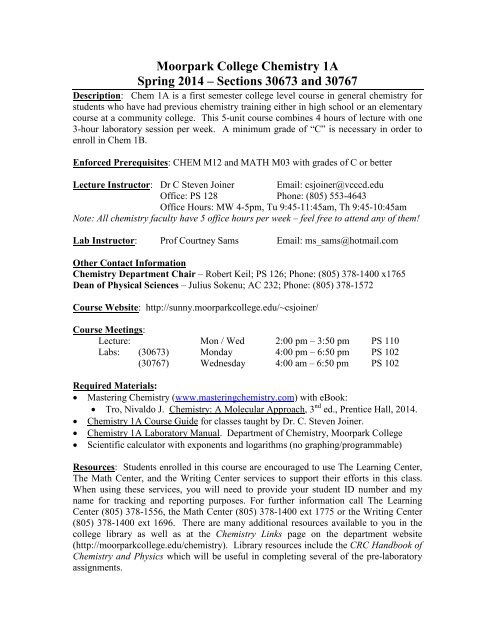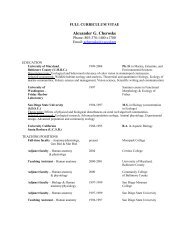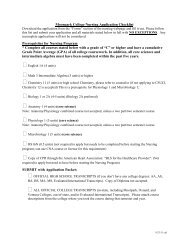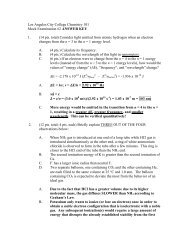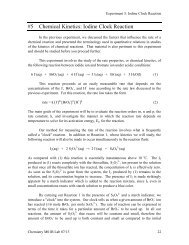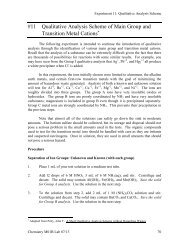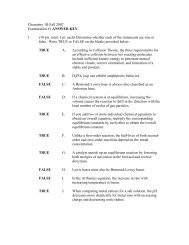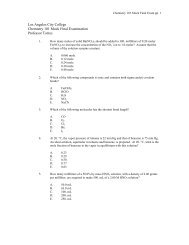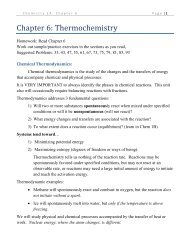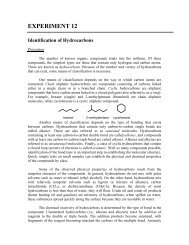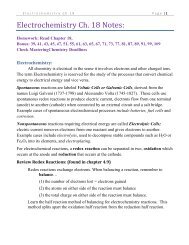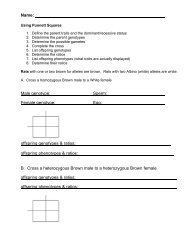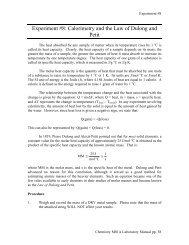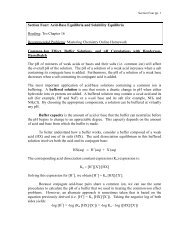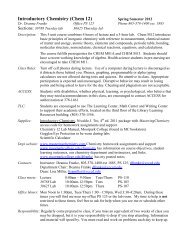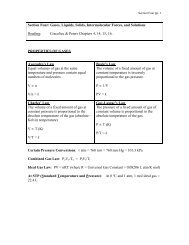Syllabus and Schedule - Moorpark College
Syllabus and Schedule - Moorpark College
Syllabus and Schedule - Moorpark College
You also want an ePaper? Increase the reach of your titles
YUMPU automatically turns print PDFs into web optimized ePapers that Google loves.
<strong>Moorpark</strong> <strong>College</strong> Chemistry 1A<br />
Spring 2014 – Sections 30673 <strong>and</strong> 30767<br />
Description: Chem 1A is a first semester college level course in general chemistry for<br />
students who have had previous chemistry training either in high school or an elementary<br />
course at a community college. This 5-unit course combines 4 hours of lecture with one<br />
3-hour laboratory session per week. A minimum grade of “C” is necessary in order to<br />
enroll in Chem 1B.<br />
Enforced Prerequisites: CHEM M12 <strong>and</strong> MATH M03 with grades of C or better<br />
Lecture Instructor: Dr C Steven Joiner Email: csjoiner@vcccd.edu<br />
Office: PS 128 Phone: (805) 553-4643<br />
Office Hours: MW 4-5pm, Tu 9:45-11:45am, Th 9:45-10:45am<br />
Note: All chemistry faculty have 5 office hours per week – feel free to attend any of them!<br />
Lab Instructor: Prof Courtney Sams Email: ms_sams@hotmail.com<br />
Other Contact Information<br />
Chemistry Department Chair – Robert Keil; PS 126; Phone: (805) 378-1400 x1765<br />
Dean of Physical Sciences – Julius Sokenu; AC 232; Phone: (805) 378-1572<br />
Course Website: http://sunny.moorparkcollege.edu/~csjoiner/<br />
Course Meetings:<br />
Lecture: Mon / Wed 2:00 pm – 3:50 pm PS 110<br />
Labs: (30673) Monday 4:00 pm – 6:50 pm PS 102<br />
(30767) Wednesday 4:00 am – 6:50 pm PS 102<br />
Required Materials:<br />
• Mastering Chemistry (www.masteringchemistry.com) with eBook:<br />
• Tro, Nivaldo J. Chemistry: A Molecular Approach, 3 nd ed., Prentice Hall, 2014.<br />
• Chemistry 1A Course Guide for classes taught by Dr. C. Steven Joiner.<br />
• Chemistry 1A Laboratory Manual. Department of Chemistry, <strong>Moorpark</strong> <strong>College</strong><br />
• Scientific calculator with exponents <strong>and</strong> logarithms (no graphing/programmable)<br />
Resources: Students enrolled in this course are encouraged to use The Learning Center,<br />
The Math Center, <strong>and</strong> the Writing Center services to support their efforts in this class.<br />
When using these services, you will need to provide your student ID number <strong>and</strong> my<br />
name for tracking <strong>and</strong> reporting purposes. For further information call The Learning<br />
Center (805) 378-1556, the Math Center (805) 378-1400 ext 1775 or the Writing Center<br />
(805) 378-1400 ext 1696. There are many additional resources available to you in the<br />
college library as well as at the Chemistry Links page on the department website<br />
(http://moorparkcollege.edu/chemistry). Library resources include the CRC H<strong>and</strong>book of<br />
Chemistry <strong>and</strong> Physics which will be useful in completing several of the pre-laboratory<br />
assignments.
Grading: One grade will be assigned for Chemistry 1A. The grade will include both<br />
lecture <strong>and</strong> laboratory work. Grades will be assigned on the basis of an overall<br />
percentage of total points earned in both lecture <strong>and</strong> the laboratory. If you fail either the<br />
lecture or lab portion of the course, the highest grade you may earn is a “D”.<br />
Lecture: 3 Lecture Exams (100 points each) 300 points<br />
7 Lecture Quizzes (30 points each) 210 points<br />
15 Mastering Chemistry Problem Sets (4 pts each) 60 points<br />
15 Discussion Board “Weeks” (2 points per week) 30 points<br />
Final Examination (Cumulative)<br />
200 points<br />
LECTURE TOTAL: 800 points<br />
Lab: 15 Informal Experiment Reports (10 points each) 150 points<br />
1 Formal Experiment Report (24 points) 24 points<br />
13 Workshop Reports (2 points each) 26 points<br />
LAB TOTAL: 200 points<br />
COURSE TOTAL POINTS: 1000 points*<br />
Grades will be assigned in conjunction with the following scale: 90 % – 100 % (A);<br />
80 % – 89.5 % (B); 70 % – 79.5 % (C); 60 % – 69.5 % (D); below 60 % (F). There are<br />
no “W” grades given by the instructor; you must officially drop the course if you stop<br />
attending or risk receiving an automatic failure.<br />
No quizzes, exams, workshops, or labs are dropped. Each of these focuses on different<br />
Chemistry 1A material <strong>and</strong> it is unreasonable to “throw out scores” just because you<br />
don’t know one subject that is a part of this course. Your lowest mastering chemistry<br />
assignment <strong>and</strong> your lowest discussion board week will be dropped. If you miss any<br />
assignment, you will receive a score of zero on that assignment. Exceptions are made<br />
only for verifiable documented emergencies.<br />
Exams <strong>and</strong> Quizzes: Examinations <strong>and</strong> quizzes will be administered periodically<br />
throughout the semester during the on-site lectures (see schedule for dates). There will<br />
be no make-up quizzes or exams. You are required to take all three exams, seven<br />
quizzes, plus the cumulative final examination. Exceptions will be made on a case-bycase<br />
basis in the event of a verifiable documented emergency if you contact the instructor<br />
BEFORE the exam (leave a voice mail message in an emergency). You will be tested on<br />
your ability to solve problems based on lecture notes <strong>and</strong> homework problems. You must<br />
bring your OWN charged calculator for each examination <strong>and</strong> quiz; no borrowing is<br />
allowed. At the end of the semester, a comprehensive final examination will be<br />
administered on Monday, May 19, 2014 from 2:45 pm until 4:45 pm. This date <strong>and</strong> time<br />
is determined by the college <strong>and</strong> cannot be rescheduled for any reason.<br />
IMPORTANT NOTE ABOUT SCHOLASTIC DISHONESTY: Anyone found cheating<br />
will receive an “F” grade <strong>and</strong> will be recommended to the Dean for further disciplinary<br />
action.
Mastering Chemistry Problem Sets: Students are required to use Mastering Chemistry<br />
to solve weekly problem sets. Each weekly problem set is available starting on<br />
Wednesday at 4pm (after lecture) <strong>and</strong> is due on the following Wednesday at 2pm (before<br />
lecture). The first assignment is due Wednesday, January 15. No assignment will be due<br />
during winter or spring break. There will be 16 weekly problem sets worth four points<br />
each. Your lowest score will be dropped. To access the problem sets, you will need to<br />
purchase a code from the textbook publisher in one of 3 ways:<br />
• If you purchase a new textbook from the student store, the access code is included<br />
for free! Make sure that you save the insert with your access code. Follow the<br />
link from the course webpage <strong>and</strong> click the “Register Student” button. When<br />
prompted, enter the course ID “JOINER2014SPRING”.<br />
• If you purchased a used book from the student store or if you purchased a book<br />
from another source, you will need to purchase an access code for $66. The book<br />
for our course is “Tro, Chemistry: A Molecular Approach, 3/e”. Follow the link<br />
from the course webpage <strong>and</strong> click the “Register Student” button. When<br />
prompted (after paying the fee), enter the course ID “JOINER2014SPRING”.<br />
• You can also purchase the access code with an e-Book. This gives you access to<br />
your textbook from any place that has an internet connection, <strong>and</strong> saves you from<br />
the need to purchase a paper textbook. This costs $110 <strong>and</strong> is the best deal financially.<br />
You will have access to the e-Book for 2 years from the date of purchase.<br />
The book for our course is “Tro, Chemistry: A Molecular Approach, 3/e”. Follow<br />
the link from the course webpage <strong>and</strong> click the “Register Student” button. When<br />
prompted (after paying the fee), enter the course ID “JOINER2014SPRING”.<br />
Weekly Discussion Board Participation: You can earn 0–2 points per week for your<br />
participation in the course discussion board. Each “week” begins on Wednesday at 4pm<br />
(after lecture) <strong>and</strong> ends the following Wednesday at 2pm (before lecture). The first<br />
“week” ends on Wednesday, January 15 at 2pm. Winter <strong>and</strong> spring breaks will be<br />
considered a part of the surrounding weeks (not separate weeks). Your lowest weekly<br />
score is dropped. Dr. Joiner will also participate in the discussion board <strong>and</strong> will not<br />
answer questions related to course content via email. Submission are evaluated on<br />
quality. Submissions that are more relevant, more detailed, more correct, more precise,<br />
<strong>and</strong> overall more useful to other students in the class will have a greater chance of<br />
earning credit. Spelling <strong>and</strong> accurate use of vocabulary words count as well. As the<br />
semester progresses <strong>and</strong> your mastery of the course material improves, the st<strong>and</strong>ards used<br />
to judge the quality of discussion board posts becomes more strict, so you should strive to<br />
improve the quality of your posts. One submission (either one question OR one answer)<br />
is worth at most one point. Any submission that contains a significant conceptual or<br />
vocabulary error cannot earn credit. Some discussion board questions may be used as<br />
exam questions, regardless of their credit worthiness. When you copy part or all of an<br />
answer from another source, you must cite the source. (A web link is useful for this.) As<br />
is true in any other circumstance, copying someone else's words without giving credit is<br />
plagiarism. Please limit yourself to one question per thread. If referring to the course<br />
guide, textbook, lab manual, or old exams, please clearly identify where the question<br />
came from. Example: “Course Guide Page 7, Question 1.4” or “Spring 2010 Exam 2,<br />
Question 15”.
Netiquette: One problem with interacting with people online is that your facial<br />
expressions cannot be read, so certain forms of communication such as sarcasm may<br />
come across as mean or rude online. Students are expected to conduct themselves in a<br />
respectful manner <strong>and</strong> adhere to the highest ethical <strong>and</strong> behavioral st<strong>and</strong>ards at all times<br />
when using any aspect of the course software. While it is okay to disagree with another<br />
student’s opinion, you may not attack the student. A full explanation of proper netiquette<br />
is located at this website: http://www.albion.com/netiquette/corerules.html<br />
Workshops: Workshops are due at the start of lab on the date listed on the schedule<br />
unless otherwise announced. Workshops are worth two points. Professor Sams will<br />
explain how workshops are graded on the first day of lab. Answer keys will be posted on<br />
the course website. Consequently, late workshops cannot be accepted. Quiz <strong>and</strong> exam<br />
problems are often inspired by the workshops.<br />
Lecture <strong>and</strong> Lab Attendance: Consistent attendance is best for all students concerned,<br />
especially in a course that entails laboratory work. As such, attendance will be taken<br />
during each laboratory period. If a student wishes to drop the course, he or she must<br />
withdraw; it is not the instructor’s responsibility to drop any student, although a student<br />
may be dropped at the instructor’s discretion if a significant number of lectures or labs<br />
are missed. Students who have not dropped this class <strong>and</strong> have stopped attending will be<br />
assigned a letter grade of “F”.<br />
Laboratory Procedure: Safety is of the utmost importance. You must always comply<br />
with the safety rules found in the safety section of your laboratory manual along with any<br />
listed experimental procedure cautions. Failure to obey these rules will result in your<br />
dismissal from this class. Moreover, safety glasses are MANDATORY at all times in<br />
the lab unless otherwise stated by the instructor. If you have not acquired safety glasses<br />
by the second week of class, you will not be allowed in the lab until you have them.<br />
Attendance is also required for the lab. If you miss more than 3 labs, your grade will be<br />
lowered significantly. Arrangements to make up labs are not guaranteed but are possible<br />
if done quickly. Moreover, attendance <strong>and</strong> successful completion of the laboratory<br />
component is required; otherwise, the highest grade you will receive is a “D”.<br />
Be Prepared for the Laboratory: Read the theory <strong>and</strong> procedures for each experiment<br />
before class <strong>and</strong> answer any pre-laboratory questions (where appropriate). In order to<br />
receive credit for the laboratory, you must obtain the instructor’s initials on your report at<br />
the end of your session, before you depart. Due dates will be announced in lab.<br />
Smoking is extremely dangerous in labs, <strong>and</strong> is prohibited everywhere on campus<br />
(including the use of e-cigarettes), except in designated parking lots.<br />
Students with Disabilities, whether physical, learning, or psychological, who believe<br />
that they may need accommodations in this class, are encouraged to contact ACCESS as<br />
soon as possible to arrange for these accommodations. Authorization, based on<br />
verification of disability, is required before any disability accommodation will be made in<br />
this class. The phone number for ACCESS is (805) 378-1461 <strong>and</strong> they are located in the<br />
building just to the right of the Campus Center.
Learning Objectives: Upon successful completion of the course, a student will be able to:<br />
• analyze <strong>and</strong> apply the scientific method to chemistry problems, including developing a<br />
hypothesis, hypothesis testing, evaluation, <strong>and</strong> modeling; list the basic units of measurement<br />
in the metric <strong>and</strong> English systems, perform unit conversions within <strong>and</strong> between systems, <strong>and</strong><br />
express results appropriately with significant figures <strong>and</strong> in scientific notation; classify<br />
matter, distinguish between physical/chemical changes <strong>and</strong> properties, <strong>and</strong> comprehend the<br />
principles of chemical reactions <strong>and</strong> energy relationships.<br />
• use dimensional analysis to perform mathematical conversions <strong>and</strong> solve problems involving<br />
stoichiometry, thermochemistry, quantum mechanics, solids, liquids, gases, <strong>and</strong> solutions.<br />
• identify the symbols of common elements, the structures of molecules <strong>and</strong> ions; name/write<br />
formulas for various elements, acids, salts, bases <strong>and</strong> inorganic compounds as well as simple<br />
organic compounds.<br />
• write balanced molecular, ionic, <strong>and</strong> net-ionic equations for synthesis, decomposition,<br />
combustion, single-replacement, double-replacement, <strong>and</strong> oxidation-reduction reactions;<br />
identify the various types of electrolytes <strong>and</strong> their behavior in chemical reactions.<br />
• solve stoichiometry <strong>and</strong> solution concentration problems involving limiting reactants, theoretical<br />
& percent yields, dilutions, titrations, gases, liquids, solids, & colligative properties.<br />
• state the various gas laws, their historical development <strong>and</strong> applications, the postulates <strong>and</strong><br />
mathematical relationships of the kinetic molecular theory of gases, why real gases differ<br />
from ideal gases; quantify real gas behavior via the van der Waals equation.<br />
• explain <strong>and</strong> solve thermochemistry problems by considering potential <strong>and</strong> kinetic energies,<br />
internal energy, specific heat <strong>and</strong> specific heat capacity, calorimetry, the First Law of<br />
Thermodynamics, <strong>and</strong> Hess's Law.<br />
• describe the quantum mechanical model <strong>and</strong> construct the historical development of the<br />
nuclear atom; explain the nature of atomic spectra <strong>and</strong> Bohr's model; conceptualize <strong>and</strong><br />
utilize the Planck-Einstein equation, Rydberg equation, de Broglie equation, <strong>and</strong> the<br />
Heisenberg Uncertainty Principle; state <strong>and</strong> apply the quantum numbers to wave mechanics;<br />
apply the Aufbau principle to writing electron configurations; account for trends in chemical<br />
periodicity involving atomic <strong>and</strong> ionic radii, ionization energy, metallic character, electron<br />
affinity, <strong>and</strong> electronegativity.<br />
• identify the different types of chemical bonding; apply Lewis <strong>and</strong> VSEPR (Valence Shell<br />
Electron Pair Repulsion) theories to draw structures <strong>and</strong> shapes, label electronic geometries,<br />
molecular geometries, <strong>and</strong> bond angles, <strong>and</strong> predict polarities for molecules <strong>and</strong> ions<br />
including resonance <strong>and</strong> structural isomers; underst<strong>and</strong> <strong>and</strong> incorporate the use of Valence<br />
Bond Theory to explain <strong>and</strong> identify various hybridizations; explain the fundamental basis of<br />
Molecular Orbital Theory for diatomic species to predict electron configurations, bond<br />
orders, <strong>and</strong> magnetic properties.<br />
• list <strong>and</strong> describe the distinguishing characteristics of solids, liquids, gases, <strong>and</strong> solutions.<br />
• conduct various quantitative <strong>and</strong> qualitative experiments with adherence to safety protocols,<br />
record observations <strong>and</strong> express numerical values using appropriate significant figures,<br />
analyze acquired data, apply statistical analysis <strong>and</strong> formulate proper conclusions through<br />
written expression of results.<br />
• define <strong>and</strong> describe the different types of intermolecular forces <strong>and</strong> their effects on matter;<br />
calculate the energy involved with temperature <strong>and</strong> phase changes; construct <strong>and</strong> interpret<br />
phase diagrams for different substances; identify unit cells for crystalline solids.<br />
• perform calculations using concentration terms that include molarity, molality, normality,<br />
parts per million, <strong>and</strong> percent by mass; underst<strong>and</strong> what affects solubilities <strong>and</strong> the concepts<br />
of colligative properties, perform quantitative calculations, <strong>and</strong> make qualitative<br />
comparisons; explain the liquid-vapor equilibrium <strong>and</strong> its effect on colligative properties;<br />
describe the behavior of electrolytes <strong>and</strong> nonelectrolytes in solution.
Drop Deadlines: January 17, 2014 (Last day to add or to drop with refund <strong>and</strong> no W)<br />
April 25, 2014 (Last day to drop with W)<br />
Reading Assignments by Topic<br />
Topic 1 – Chapter 1: Sections 1 – 8<br />
Topic 2 – Chapter 2: Sections 1 – 9<br />
Topic 3 – Chapter 3: Sections 1 – 12<br />
Topic 4 – Chapter 4: Sections 1 – 9; Chapter 15: Section 5; Chapter 18: Section 2<br />
Topic 5 – Chapter 5: Sections 1 – 10<br />
Topic 6 – Chapter 6: Sections 1 – 10<br />
Topic 7 – Chapter 7: Sections 1 – 6<br />
Topic 8 – Chapter 8: Sections 1 – 9<br />
Topic 9 – Chapter 9: Sections 1 – 11<br />
Topic 10 – Chapter 10: Sections 1 – 8; Chapter 11: Section 13<br />
Topic 11 – Chapter 11: Sections 1 – 12<br />
Topic 12 – Chapter 12: Sections 1 – 8<br />
Disclaimer: This syllabus is a guide for what is expected in sections 30673 <strong>and</strong> 30767 of<br />
Chem 1A for Spring 2014. Alterations at the instructor’s discretion are likely, due to the<br />
fact that the instructor is expecting a baby in March.
Dates Monday Lecture Wednesday Lecture<br />
1/6 - 1/8 Introduction & Topic 1 (Matter & Measurement) Topic 1 & Topic 2<br />
1/13 - 1/15 Topic 2 (Atoms, Elements, & Ions) Topic 3 (Molecules, Compounds, & Equations)<br />
1/20 - 1/22 No Class - Martin Luther King Jr Day Holiday Quiz 1 (Topics 1 & 2) / Topic 3<br />
1/27 - 1/29 Topic 4 (Reactions in Aqueous Solutions) Quiz 2 (Topic 3) / Topic 4<br />
2/3 - 2/5 Topic 4 & Topic 5 Topic 5 (Gases)<br />
2/10 - 2/12 Exam 1 (Topics 1 - 4) Topic 5 (Gases)<br />
2/17 - 2/19 No Lecture - Winter Break No Lecture - Winter Break<br />
2/24 - 2/26 Topic 6 (Thermochemistry) Quiz 3 (Topic 5) / Topic 6<br />
3/3 - 3/5 Topic 6 (Thermochemistry) Topic 7 (Quantum Mechanics)<br />
3/10 - 3/12 Quiz 4 (Topic 6) / Topic 7 Topic 8 (Periodicity)<br />
3/17 - 3/19 Topic 8 & Topic 9 Topic 9 (Lewis Theory)<br />
3/24 - 3/26<br />
Floating Catch Up Day<br />
(To move as needed for birth of instructor's child)<br />
Exam 2 (Topics 5 - 8)<br />
3/31 - 4/2 No Lecture - Spring Break No Lecture - Spring Break<br />
4/7 - 4/9 Topic 9 & Topic 10 Topic 10 (VSEPR, Valence-Bond, & MO Theories)<br />
4/14 - 4/16 Quiz 5 (Topic 9) / Topic 10 Topic 10 & Topic 11<br />
4/21 - 4/23 Topic 11 (Liquids, Solids, & Intermolecular Forces) Quiz 6 (Topic 10) / Topic 11<br />
4/28 - 4/30 Topic 11 & Topic 12 Topic 12 (Solutions <strong>and</strong> Their Properties)<br />
5/5 - 5/7 Exam 3 (Topics 9 - 11) Topic 12 (Solutions <strong>and</strong> Their Properties)<br />
5/12 - 5/14 Quiz 7 (Topic 12) / Review for Final Exam No Lecture - Study for Final Exam<br />
Final Exam<br />
Chemistry 1A Sections 30673 <strong>and</strong> 30767 Lecture <strong>Schedule</strong> Spring 2014<br />
Dr C Steven Joiner<br />
Monday, May 19, 2014 -- 2:45 pm - 4:45 pm
Chemistry 1A Sections 30673 <strong>and</strong> 30767 Laboratory <strong>Schedule</strong> Spring 2014<br />
Dr C Steven Joiner <strong>and</strong> Prof Courtney Sams<br />
Dates Monday Laboratory Wednesday Laboratory<br />
1/6 - 1/8 Do In Lab: Safety / Check In / Workshop 2 Do In Lab: Safety / Check In / Workshop 2<br />
1/13 - 1/15 Do In Lab: Experiment 2 Do In Lab: Experiment 2<br />
1/20 - 1/22 No Lab - Martin Luther King Jr Day Holiday<br />
Due Start of Lab: Workshop 1 Do<br />
In Lab: Experiment 1<br />
1/27 - 1/29<br />
Due Start of Lab: Workshop 1 Do<br />
Due Start of Lab: Workshops 3 & 5<br />
In Lab: Experiment 1<br />
Do In Lab: Experiment 5<br />
2/3 - 2/5<br />
Due Start of Lab: Workshops 3 & 5<br />
Due Start of Lab: Workshop 4 (Skip Synthesis & Decomp)<br />
Do In Lab: Experiment 5<br />
Do In Lab: Experiment 3<br />
2/10 - 2/12<br />
Due Start of Lab: Workshop 4 (Skip Synthesis & Decomp)<br />
Due Start of Lab: Workshop 6<br />
Do In Lab: Experiment 3<br />
Do In Lab: Experiment 6<br />
2/17 - 2/19 No Lab - Winter Break No Lab - Winter Break<br />
2/24 - 2/26<br />
Due Start of Lab: Workshop 6<br />
Due Start of Lab: Workshop 7<br />
Do In Lab: Experiment 6<br />
Do In Lab: Experiment 7<br />
3/3 - 3/5<br />
Due Start of Lab: Workshop 7<br />
Due Start of Lab: Workshop 8<br />
Do In Lab: Experiment 7<br />
Do In Lab: Experiment 11<br />
3/10 - 3/12<br />
Due Start of Lab: Workshop 8<br />
Do In Lab: Experiment 12<br />
Do In Lab: Experiment 11<br />
3/17 - 3/19<br />
Due Start of Lab: Workshop 9<br />
Due Start of Lab: Workshop 9<br />
Do In Lab: Experiment 12<br />
Do In Lab: Experiment 8<br />
3/24 - 3/26<br />
Due Start of Lab: Workshop 10<br />
Due Start of Lab: Workshop 10<br />
Do In Lab: Experiment 8<br />
Do In Lab: Experiment 9<br />
3/31 - 4/2 No Lab - Spring Break No Lab - Spring Break<br />
4/7 - 4/9 Do In Lab: Experiment 9 Do In Lab: Experiment 10<br />
4/14 - 4/16 Do In Lab: Experiment 10 Do In Lab: Experiment 15 - Parts I <strong>and</strong> II<br />
4/21 - 4/23 Do In Lab: Experiment 15 - Parts I <strong>and</strong> II<br />
Due Start of Lab: Experiment 15, Part V<br />
Do In Lab: Experiment 15, Parts III, IV <strong>and</strong> VI<br />
4/28 - 4/30<br />
Due Start of Lab: Experiment 15, Part V<br />
Due Start of Lab: Workshops 11 & 12<br />
Do In Lab: Experiment 15, Parts III, IV <strong>and</strong> VI<br />
Do In Lab: Experiment 15, Parts VII <strong>and</strong> VIII<br />
5/5 - 5/7<br />
Due Start of Lab: Workshops 11 & 12<br />
Due Start of Lab: Formal Report (Expt 15) & Workshop 13<br />
Do In Lab: Experiment 15, Parts VII <strong>and</strong> VIII<br />
Do In Lab: Experiment 13 / Check Out<br />
5/12 - 5/14<br />
Due Start of Lab: Formal Report (Expt 15) & Workshop 13<br />
No Lab - Study for Final Exam<br />
Do In Lab: Experiment 13 / Check Out


